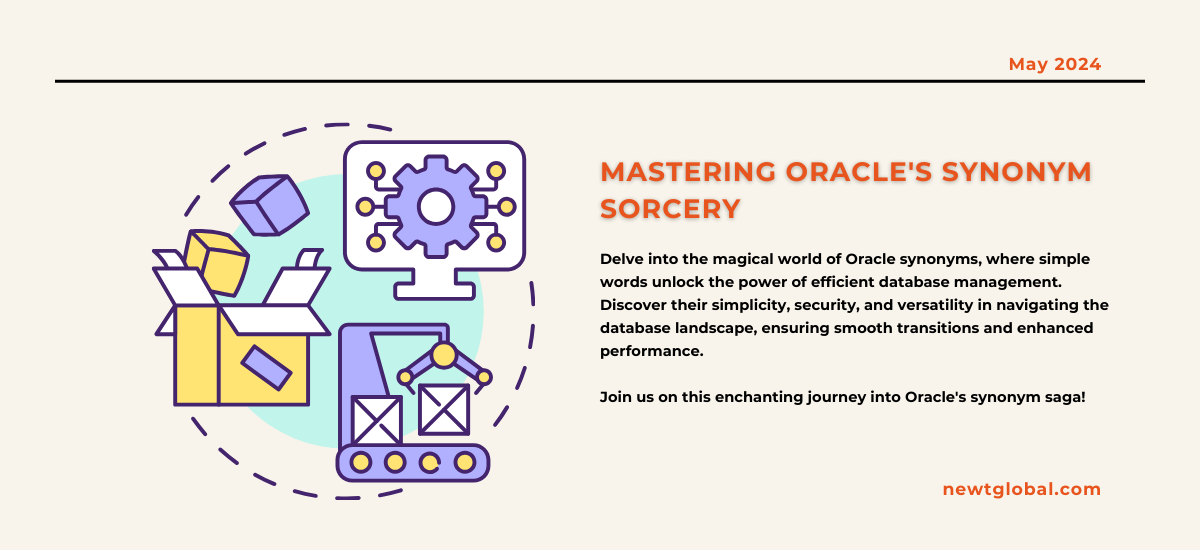
Welcome to our special class all about words that mean the same thing in Oracle! These words aren’t just boring parts of managing databases—they’re like magic ingredients that make Oracle more fun. Whether you’re new or you’ve been using Oracle for a while, learning about these words is like finding a treasure chest of ways to make your database searches better. In this blog post, we’ll guide you through everything you need to know about these words in Oracle, from what they are to the best ways to use them.
The Enchantment of Synonyms
Think of these words like special passes that let you into the backstage area of Oracle. They let you get to database things you like without needing to use long and complicated names. These handy nicknames make searching for things in the database easier.
Why Embrace the Synonym Sorcery?
There are a few good reasons to use these words:
-
- Simplicity: These words give you easier names for database stuff, making it simpler to write commands and less likely to make mistakes.
-
- Security: Like a magician’s trick, these words hide the real names of things in your database, keeping them safe from prying eyes.
-
- Accessing Different Databases: These words help you move between different parts of your database easily.
-
- Dealing with Changes: Even if things change in your database, these words stay the same, helping your applications stay on track.
-
- Making Synonyms: Creating synonyms in Oracle is easy. You use a command that looks like this:
CREATE [OR REPLACE] [PUBLIC] SYNONYM [schema .] synonym_name
FOR [schema .] object_name [@ dblink];
Here’s what all that means:
-
- PUBLIC: This means everyone can use the word.
-
- synonym_name: This is the name you want to use instead of the real name.
-
- schema.object_name: This is the real name of the thing you’re making a word for. If you leave it out, Oracle will think it’s in the current part of the database.
-
- dblink: This is if you’re making a word for something in a different database.
Advanced Tips
Synonyms are powerful, but they also come with some important things to remember:
-
- Be Careful with Changes: As you update your database, synonyms help everything stay connected.
-
- Performance: Synonyms are usually fast and don’t slow things down, but don’t overdo it to avoid confusion.
Best Practices
-
- Use Sparingly: Don’t make everything public. Use synonyms thoughtfully to avoid name conflicts.
-
- Keep Good Records: Write down what synonyms you’ve created to stay organized.
-
- Stay Secure: Make sure only the right people can use your synonyms.
The Synonym Saga Continues
This is just the start of making the most of Oracle with synonyms. They’re a powerful tool that can make you much more efficient. Keep practicing and discovering how they can help you manage your data better. Happy databasing!
Unveil the Oracle Synonym Sorcery with Newt Global!
As we wrap up our journey through the world of Oracle synonyms, remember that these tools are just the beginning of optimizing your database management skills. Whether you’re refining your existing projects or starting new ones, synonyms are a gateway to a more streamlined and efficient workflow.
Before you go, we have an exciting opportunity to share: Newt Global DMAP is a top-tier product designed specifically to revolutionize the way Oracle Databases are migrated to cloud-native PostgreSQL. With Newt Global DMAP, you can achieve faster, better, and more cost-effective migrations, making it the perfect solution for anyone looking to make the leap to cloud-native databases.
Interested in learning more about how Newt Global DMAP can transform your database migration process? Visit us at newtglobal.com for more information. And if you have any questions or need to get in touch with our team, don’t hesitate to reach out at marketing@newtglobalcorp.com.
